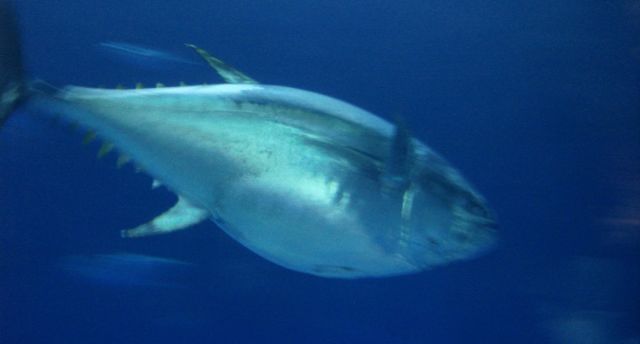Photo Credit: Mark Doliner
You have always believed that adding more fish to your diet is a good thing, right? But Ornish Lifestyle Medicine recommends removing all fish from your diet if you are trying to reverse severe coronary heart disease, type 2 diabetes, hypercholesterolemia, high blood pressure, and early-stage prostate cancer.
Ornish Lifestyle Medicine is the only diet and lifestyle program that has been scientifically proven to reverse heart disease without drugs and surgery. A series of randomized controlled trials published in a leading peer-reviewed journal over the past 37 years have clearly demonstrated that a very low-fat, whole-food vegetarian lifestyle can reverse the progression of some serious diseases.
It also has been shown that the very same vegetarian diet and lifestyle can change your genes, turning on protective genes and turning off those that promote inflammation, oxidative stress as well as oncogenes that promote prostate cancer, breast cancer and colon cancer. That’s more than 500 genes in only 3 months! These lifestyle changes affect the chromosomes that regulate aging, thereby reversing aging at a cellular level.
Because this research did not include fish as part of the lifestyle approach that was shown to reverse disease, it is not recommended as part of your diet. Other approaches that include fish such as the Mediterranean diet and research such as a 2013 study have shown reduction in cardiovascular disease, but not reversal of the disease. Fish may be lower in saturated fat, but it still contains a significant amount of cholesterol that for some people can lead to elevated cholesterol and heart disease.
Ornish Diet: No TMAO
The vegetarian approach that is recommended as part of Ornish Lifestyle Medicine is low in saturated fat and cholesterol. By eliminating animal protein, including fish, you are also avoiding other substances that we are just now discovering that can lead to heart disease. A 2013 study, as well as other studies, for example, demonstrated similar findings. The studies showed that a substance called carnitine present in animal foods such as red meat, dairy and fish is metabolized by certain gut bacteria, which increases a substance called TMAO. TMAO poses risk for heart disease, kidney disease and prostate cancer. The way it happens is that certain gut bacteria metabolize the carnitine to a toxic substance called trimethylamine. Trimethylamine then gets oxidized in our liver to TMAO (trimethylamine-n-oxide), which then circulates throughout our bloodstream. Elevated levels of TMAO increases the buildup of plaque in the arteries, increasing risk of heart disease.
The benefits of plant protein and fiber
The reversal vegetarian approach is high in fiber, which can reduce cholesterol and is packed with hundreds of substances that promote health and healing. These health-promoting substances are protective against heart disease and have anticancer and antiaging properties.
You probably always thought that fish was a healthy choice because it is lower in fat than meat and some species contain omega 3, which is beneficial for heart and cognitive health, immune function, and the ability to lower oxidative stress and inflammation. And it’s true: Some studies have shown a positive association of fish intake on cardiovascular disease, which is often linked with an increase in omega 3 and a decrease in saturated fat when fish is substituted for meat. So, if you are following the Ornish diet to lose weight and improve your health you can include fish in your diet.
But if you are trying to reverse heart disease, remember that fish doesn’t have health-promoting fiber and can crowd out the nutrient-dense plant foods, which are packed with cardioprotective antioxidants and health-promoting phytochemicals. When you choose beans or lentils as your protein, you also nourish your body with fiber and allow the healthy good bacteria in your gut to flourish. To learn how the Ornish Reversal diet works to balance the composition of gut flora and prevent diseases including heart disease, diabetes, and kidney disease, we recommend our Ornish Living article, The Gut Heart Connection.
Fish and toxins
Although fish does provide protein, this protein also comes with cholesterol and toxins. The health effects of fish consumption remain a topic of debate in the media and among health organizations, so it’s understandable if you feel confused.
Researchers have closely examined the potential health effects of chronic low-level mercury exposure from even modest fish consumption. This is a concern for children and pregnant women. A 2016 study released by the Environmental Working Group, a nonprofit, nonpartisan organization dedicated to protecting human health and the environment, studied the mercury levels in women who ate fish or seafood at least twice a week. Almost 30 percent more mercury was found in the women’s bodies than is considered safe by the Environmental Protection Agency. This study has brought attention to stricter government guidelines around fish for women during pregnancy.
Mercury can have toxic effects on the nervous, digestive and immune systems, and on the lungs, kidneys, skin and eyes, according to the World Health Organization. Certain other contaminants sometimes found in fish have been linked to some cancers and reproductive problems.
If you are still confused about the health effects of fish, the question may be: Is it worth eating fish for the omega 3 or is it just a just a healthier substitution for high-cholesterol meat and saturated fat? Swapping fish for meat is like switching to a lower nicotine cigarette to decrease risk for lung cancer. It is a step in the right direction, but why not take a bigger leap and swap meat for plant proteins such high-fiber, nutrient-dense legumes and cardioprotective soy foods that clearly make the biggest impact on your health in a multitude of ways.
Looking for other ways to live a healthier, happier life? Reverse heart disease and diabetes, lose weight and reduce your cancer risk with these tips from Dean Ornish.
This content was originally published on Ornish Living.






